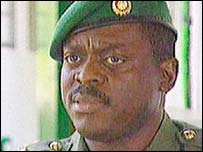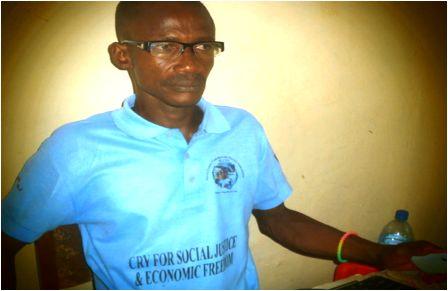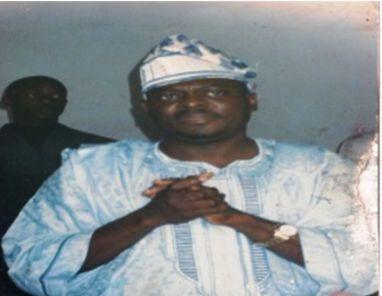Amnesty for Johnny Paul Koroma- A bar to prosecution?
A campaign started by some Sierra Leoneans imploring the president to pardon or grant blanket amnesty to Johnny Paul Koroma (in photo) is in full effect. Some proponents of the pardon argue that ‘for true peace and reconciliation for our people and the country, set Johnny Paul Koroma free or grant him blanket amnesty for any crimes he might have committed if he did it for all other persons in and out of our country so that we can turn to a completely new page.’ They furthered that ‘let us appreciate the fact that, we cannot always solve our problems by retaliation especially if we desire to be forgiven for our own trespasses.’
The campaigners want EBK to set JPK free or grant him blanket amnesty. How can a group of sympathisers beg the president to free JPK who is legally and ‘factually’ dead? On 7 March 2003, the prosecutor of the Special Court for Sierra Leone indicted JPK for his role in RUF/AFRC. He fled Freetown in December to Liberia. On 1 June 2003, he was officially declared dead under mysterious circumstances. Although the Special Court prosecutor at that time noted that DNA tests on the remains found in Lofa County did not match Koroma’s DNA, he is yet presumed dead. How then are the campaigners begging the president to set him free? Was he tried by a Sierra Leonean Court and imprisoned in Sierra Leone? The answer is no. So, the campaigners should not be begging for his freedom as he has never been tried and imprisoned. Moreover, it is out of place to ask the president to grant JPK a blanket amnesty. Such amnesty is against the constitution of Sierra Leone and international law.
Section 63(1a) of the 1991 Constitution accords the president the Prerogative of Mercy. On grounds of Section 63(1a), the President may, acting in accordance with the advice of a Committee appointed by the Cabinet over which the Vice-President shall preside, grant any person convicted of any offence against the laws of Sierra Leone a pardon, either free or subject to lawful conditions. The president, therefore, does not have the constitutional right to grant Johnny Paul Koroma a pardon or an amnesty for crimes he has not been tried and convicted of.
In addition, giving JPK an amnesty or pardon will be in contravention of Section 13(j), which stipulates that every citizen should render assistance to appropriate and lawful agencies in the maintenance of law and order. Although the President enjoys extra rights, he still is a citizen and this section is also applicable to him. He should therefore not do anything that will compromise the maintenance of law and order. If he grants JPK pardon or amnesty, he will impede the proper functioning of the police who are saddled with the task of arresting people who have been accused of committing crimes. In other word, he will not be rendering assistance to appropriate and lawful agencies in the maintenance of law and order.
If the president grants a pardon to Johnny Paul Koroma, he will be acting in violation of international law. When the SCSL closed its operation in 2013 a residual mechanism- the Residual Special Court for Sierra Leone (RSCSL) – was established. The United Nations and the Government of Sierra Leone signed on 11 August 2010 the Agreement on the Establishment of a Residual Special Court for Sierra Leone (RSCSL). It was ratified by parliament on 15 December 2011 and made into law on 1 February 2012. The RSCSL is responsible for the ongoing legal obligations of the Special Court for Sierra Leone, which include supervision of prison sentences, witness protection and support, maintenance and preservation of the archives, assistance to national prosecution authorities and the trial of Johnny Paul Koroma.
Article 8 of the Statute of the Residual Special Court for Sierra Leone states that the Government of Sierra Leone shall cooperate with the Residual Special Court in all its operation and shall comply without undue delay with any request for assistance by the Residual Special Court or an order issued by the Chambers, including, but not limited to identification and location of persons; service of documents; arrest or detention of persons; and transfer of an indictee to the Residual Special Court. It follows from this that any amnesty granted to JPK by the President will amount to a gross violation of the agreement as government agencies who have the task of executing the request for assistance will not be able to perform their functions properly.
What are the legal implications if the President grants JPK amnesty? Can JPK invoke the amnesty before the Residual Court? Any amnesty granted by the President to JPK will have no legal effect before RSCSL as article 10 of the Statute states that an amnesty granted to any person falling within the jurisdiction of the Residual Special Court in respect of the crimes referred to in Articles 2 to 4 of the present Statute shall not be a bar to prosecution. It must be pointed out that if, for example, the president makes use of his Executive Power to grant any amnesty, JPK cannot invoke it before a court with an international character.
The UN Special representative made it crystal clear at the signing ceremony in 2002 of the Special Court for Sierra Leone that the amnesty clause in Lomé Agreement “shall not apply to the international crimes of genocide, crimes against humanity, war crimes and other serious violations of international humanitarian law. This standpoint of the UN Representative was later buttressed by a landmark decision made by the Appeals Chamber in The Prosecutor v. Morris Kallon and Brima Buzzy Kamara case. The Chamber reaffirmed that “an amnesty granted to any person falling within the jurisdiction of the Special Court in respect of the crimes referred to in articles 2 to 4 of the present Statute shall not be a bar to prosecution.” Moreover, the grant of an amnesty for international crimes therefore is not only in breach of international law, “but is in breach of an obligation of a State towards the international community as a whole.” The Chamber further argued that amnesties granted by Sierra Leone, therefore, cannot cover crimes under international law, as they are subject to universal jurisdiction and by reason of the fact that “the obligation to protect human dignity is a peremptory norm and has assumed the nature of obligation erga omnes.”
In this article I have argued that any amnesty or pardon granted to Johnny Paul Koroma by the president will violate national and international laws. Moreover, any grant of amnesty to JPK will not have any legal effect before the Residual Special Court as amnesties granted under national law shall not be a bar to prosecution under international law.
Mohamed Kunowah Kiellow, The Netherlands.
Stay with Sierra Express Media, for your trusted place in news!
© 2016, https:. All rights reserved.





